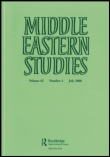
MIDDLE EASTERN STUDIES
Scope & Guideline
Navigating the Rich Tapestry of Middle Eastern Studies
Introduction
Aims and Scopes
- Historical Analysis of Political Developments:
The journal frequently explores historical events that have shaped the modern political landscape of the Middle East, including colonial legacies, nationalist movements, and the evolution of statehood. - Cultural Studies and Identity Formation:
There is a strong emphasis on the cultural dimensions of Middle Eastern societies, including discussions on literature, art, and social movements that illustrate the complexities of identity in the region. - Socioeconomic Dynamics and Modernization:
Research often addresses the economic transformations within Middle Eastern nations, analyzing factors such as oil economies, trade, and the impacts of globalization on local communities. - Gender and Society:
The journal includes significant discourse on gender roles and relations within Middle Eastern contexts, highlighting women's movements and their contributions to social change. - Interdisciplinary Approaches:
By integrating perspectives from history, sociology, political science, and cultural studies, the journal presents a holistic view of the issues affecting the Middle East.
Trending and Emerging
- Impact of Globalization:
There is an increased focus on how globalization affects Middle Eastern societies, economies, and politics, demonstrating a growing interest in the interconnectedness of local and global processes. - Post-Colonial Theory and Identity Politics:
Research exploring post-colonial narratives and their impact on identity politics within the Middle East is on the rise, reflecting a broader trend towards understanding historical context in contemporary issues. - Environmental Issues and Resource Management:
Emerging themes include the environmental challenges faced by Middle Eastern countries, such as water scarcity and climate change, which are becoming increasingly pertinent in the discourse. - Digital Humanities and New Media:
The integration of digital tools and analyses in studying Middle Eastern cultures, including the influence of social media on political movements and societal change, is gaining traction. - Regional Conflicts and Human Rights:
There is a notable increase in research addressing human rights issues and the implications of regional conflicts, reflecting the urgency of these topics in the current political climate.
Declining or Waning
- Traditional Ottoman Studies:
While still relevant, research focused solely on the Ottoman Empire's administrative and cultural aspects has seen a decline, as scholars increasingly turn to contemporary issues and their historical roots. - Narrow Nationalist Perspectives:
There seems to be a waning interest in studies solely centered on nationalist movements without connecting them to broader regional or global frameworks, indicating a shift towards more transnational analyses. - Cold War Studies:
Papers dealing specifically with the Cold War era's implications for Middle Eastern politics are less common, as current geopolitical dynamics draw more attention from researchers.
Similar Journals

Middle East Journal of Culture and Communication
Advancing Understanding of Communication PathwaysMiddle East Journal of Culture and Communication is a vital scholarly platform published by BRILL, dedicated to fostering an understanding of cultural dynamics and communication pathways within the Middle East. Established in 2008, this journal delivers a rich array of interdisciplinary research spanning the fields of Arts and Humanities, Communication, Cultural Studies, Political Science, and Sociology. With an impact factor reflective of its commitment to high-quality scholarship, it currently ranks in various quartiles, including Q3 in Arts and Humanities (miscellaneous) and Q4 in Communication and Political Science, demonstrating its importance in the academic discourse surrounding these disciplines. The journal's open access policy ensures that critical insights and analyses are widely disseminated, catering to a global audience of researchers, professionals, and students alike. The Middle East Journal of Culture and Communication stands as an essential resource for those seeking to explore the intricate tapestry of cultural interactions in the region through rigorous academic inquiry.
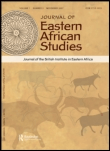
Journal of Eastern African Studies
Advancing Knowledge on Eastern Africa's ComplexitiesJournal of Eastern African Studies, an esteemed publication within the field of anthropology, cultural studies, history, and political science, is published by Routledge Journals, Taylor & Francis Ltd from its base in the United Kingdom. With an impressive impact factor reflected by its Q1 ranking in multiple categories—including anthropology, cultural studies, and history—this journal stands as a critical resource for scholars and professionals interested in understanding the complexities of Eastern Africa. Since its inception in 2009, the journal has explored diverse themes pertinent to the region's socio-political landscape, indigenous cultures, and historical trajectories, while contributing significantly to ongoing academic discourse. Although currently not an open-access journal, its commitment to high-quality scholarship and its accessibility through major academic databases underscore its importance in advancing research and fostering deeper insights into Eastern African Studies. The journal's rigorous peer-review process ensures that only the most relevant and impactful research is disseminated, solidifying its position as a leading outlet in the field.
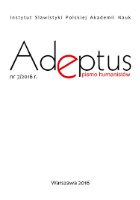
Adeptus
Illuminating the Depths of Slavic Languages and CulturesAdeptus is a pioneering open-access journal published by the Polish Academy of Sciences, Institute of Slavic Studies, specializing in Slavic studies and cultural research. Since its inception in 2014, the journal has aimed to foster scholarly dialogue and advance knowledge across various disciplines related to Slavic languages, literature, history, and sociology. With an ISSN of 2300-0783, Adeptus has positioned itself as a vital resource for researchers, professionals, and students engaged in Slavic studies, offering a platform for high-quality, peer-reviewed articles that explore diverse topics within the field. The journal's open-access model promotes accessibility and dissemination of knowledge, making it a significant contributor to the academic landscape. Located in Warsaw, Poland, Adeptus continues to thrive as a key outlet for innovative research, inviting submissions that embody rigorous scholarship and insightful perspectives.

Transylvanian Review
Advancing Scholarship on Eastern European HeritageTransylvanian Review is an esteemed academic journal published by the CENTER TRANSYLVANIAN STUDIES, focusing on the fields of cultural studies and history. Since its inception in 2008, this journal has been committed to exploring the historical and cultural dynamics of Transylvania and the broader region, contributing to the scholarly discourse on Eastern European studies. Although currently classified in the Q4 quartile of both cultural studies and history in 2023, it serves as a valuable resource for researchers, professionals, and students aiming to deepen their understanding of cultural intersections and historical narratives. With its commitment to interdisciplinary approaches and rigorous scholarship, Transylvanian Review plays an essential role in fostering dialogue and insight within the academic community, and it aims to continue expanding its influence through accessible and impactful articles. Based in Cluj-Napoca, Romania, it enriches the academic landscape with a unique focus on regional studies.

JOURNAL OF MODERN AFRICAN STUDIES
Transforming Perspectives on Africa's FutureJOURNAL OF MODERN AFRICAN STUDIES, published by CAMBRIDGE UNIV PRESS, is a premier academic journal that has been a cornerstone for interdisciplinary research on contemporary issues facing Africa since its inception in 1963. With an ISSN of 0022-278X and an E-ISSN of 1469-7777, this journal plays a critical role in shaping the discourse around African studies, encompassing vital topics in Geography, Planning and Development and Sociology and Political Science. The journal holds a commendable Q2 quartile ranking in both fields, indicating its solid reputation and influence, with Scopus ranks reflecting its academic impact within the top echelons of social sciences. The journal’s commitment to quality scholarship aims to foster a deeper understanding of socio-political dynamics, cultural transformations, and economic developments across the continent. While it does not offer open access, its rigorous peer-review process ensures that contributions are impactful and relevant to researchers, professionals, and students alike. The JOURNAL OF MODERN AFRICAN STUDIES continues to be essential reading for anyone engaged in the ever-evolving narratives of modern Africa.

Insight Turkey
Exploring the Dynamics of Politics and Society in TurkeyInsight Turkey is a leading academic journal published by the SETA Foundation, focusing on pivotal issues within the realms of Political Science and International Relations. By offering a platform for scholarly discussion, the journal provides critical analyses and informed perspectives on socio-political dynamics in Turkey and beyond, making it essential reading for researchers, professionals, and students alike. With an ISSN of 1302-177X and an E-ISSN also of 1302-177X, Insight Turkey is recognized within academic circles, reflected by its positioning in the Q3 quartile for both Political Science and Sociology by 2023 rankings. This journal not only contributes significantly to its fields, ranking #463 out of 706 in Political Science and #981 out of 1466 in Sociology, but it also engages with contemporary issues critically and cross-disciplinarily. Although it currently does not offer open access, Insight Turkey remains a valuable resource for those invested in understanding the complexities of political landscapes and social phenomena, with publications running from 2009 to 2024. For academics looking to deepen their insights and engage with emerging research, Insight Turkey is an indispensable asset.
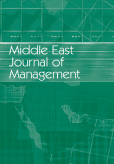
Middle East Journal of Management
Exploring Management Dynamics in the Middle EastThe Middle East Journal of Management, published by INDERSCIENCE ENTERPRISES LTD, is a pivotal academic platform that focuses on the dynamics and intricacies of management practices within the Middle Eastern context. With its ISSN 2050-3636 and E-ISSN 2050-3644, this journal serves as a vital resource for researchers, professionals, and students seeking to explore innovative management strategies, policy implications, and regional business trends. Although open access is not currently offered, readers can access cutting-edge research that significantly contributes to the understanding of management in rapidly evolving economies. Nestled in the heart of Geneva, Switzerland, this journal not only aims to foster scholarly discussions but also to enhance management practices that reflect the unique cultural and economic landscapes of the Middle East. As the field continues to grow, the Middle East Journal of Management stands as an essential publication for those dedicated to advancing knowledge and excellence in management within this region.
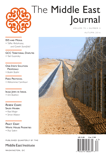
MIDDLE EAST JOURNAL
Fostering Academic Excellence in Middle Eastern DiscourseThe Middle East Journal, published by the esteemed Middle East Institute, serves as a vital platform for scholarly discourse on the complexities of the Middle East, encompassing rich analyses in the fields of Sociology, Political Science, and Geography. With a legacy dating back to 1976, this journal continues to shape contemporary dialogues, offering rigorous research and insights that influence policy-making and academic studies alike. Academic readers will note its Scopus rankings, positioning it within the lower quartiles of Geography, Planning and Development and Sociology and Political Science, reflecting an opportunity for growth and increased visibility within these fields. Although the journal is not open access, it remains an essential resource for those aiming to enhance their understanding of the historical and current dynamics of the Middle East. The Middle East Journal stands as a testament to the region's complex socio-political landscape and offers a comprehensive lens for both established scholars and aspiring researchers.

Asian Journal of Middle Eastern and Islamic Studies
Illuminating the Rich Tapestry of Islamic TraditionsThe Asian Journal of Middle Eastern and Islamic Studies, published by TAYLOR & FRANCIS LTD, is an esteemed peer-reviewed journal devoted to the comprehensive exploration of Middle Eastern and Islamic studies. With an ISSN of 2576-5949 and an E-ISSN of 2576-5957, the journal provides a platform for cutting-edge research and scholarly analysis that contributes significantly to the understanding of contemporary and historical issues within these dynamic fields. The journal seeks to attract a global readership of researchers, professionals, and students, enhancing interdisciplinary discourse and promoting scholarly excellence. By offering insights ranging from socio-political developments, cultural studies, and Islamic traditions to modern implications, the journal stands out as an essential resource for those engaged in this vital area of study, fostering a deeper understanding of the complexities and nuances of the region.

Review of Middle East Studies
Fostering Global Connections in Middle East StudiesReview of Middle East Studies, published by Cambridge University Press, is an essential academic journal that serves as a platform for interdisciplinary research focused on the Middle East. With an ISSN of 2151-3481 and an E-ISSN of 2329-3225, this journal has been disseminating impactful scholarship since its inception in 2007. Despite its placement in Q4 for Cultural Studies and Sociology and Political Science, and Q3 for History in the 2023 journal rankings, it continues to attract diverse contributions and discussions that enrich our understanding of the region. The journal's scope encompasses a broad spectrum of themes, enabling researchers and educators alike to engage with contemporary issues facing the Middle East. Although it operates under a traditional access model, its significance and contribution to academic discourse in the humanities and social sciences cannot be understated. With its headquarters in the United States, this journal fosters global connections and paves the way for future research endeavors in related fields.